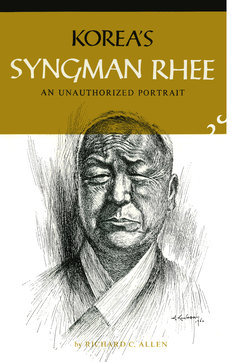Читать книгу Korea's Syngman Rhee - Richard C. Allen - Страница 9
На сайте Литреса книга снята с продажи.
ОглавлениеForeword
OF ALL the peoples in the world, hardly any has found the road to freedom and human dignity more beset with perils than have the Koreans. For centuries they were victims of their own misrule; then, when the protective hand of China was withdrawn at the end of the nineteenth century. Korea found itself at the mercy first of Japanese militarism and then of Soviet imperialism. For the first half of the twentieth century the Japanese saw to it that Korea remained the Hermit Kingdom. Indeed, the peninsula was effectively blocked off from Western political and philosophical thought until after 1945.
When the Japanese surrender brought the liberation of Korea after World War II, freedom came only to the southern half. Even here, foreign domination was succeeded by domestic turmoil and finally by civil war. For over a decade, Korea was a cold-war pawn in her international relations and a tightly run police state in her domestic affairs. Not until 1960 did the Korean people assume a major voice in the determination of their country’s destiny. They could not eject the Communists from the northern half of their homeland, but they could and did move their own half of Korea a step in the direction of political freedom. The future is in the hands of the people of South Korea.
Yet if South Korea is at the threshold of a new era, what of the old? One man spanned the decades between the period of Chinese suzerainty in Korea—through the Japanese occupation and for almost fifteen years following World War II—and the recent revolution. He reached a pinnacle of popularity during the post-liberation period, yet twelve years later was thrown out of office by revolution. The man is Syngman Rhee, who during his own lifetime has become almost a legend in both the East and the West and who, in much of the world, is considered the veritable embodiment of the struggle for Korean independence.
It is always saddening when a patriot is corrupted by the power that comes to him as a gift from his people after a lifetime ol service to his country. Yet the same people who demanded the resignation of Syngman Rhee as their president in April of 1960 recalled enough of his earlier services to cheer him as he reluctantly abdicated the absolute authority that he had held for so many years.
The story of South Korea is indeed the story of its erstwhile president, even as the fall of his government can be traced directly to the personal shortcomings of the head of state. In retrospect, Rhee as president had two great failings. One was his ego: his unwillingness to accept criticism and his obsession with his own infallibility. The second was his advanced age, a condition over which he had no control but which underscored his tendencies toward inflexibility and irresponsibility. So formidable were the problems involved in dealing with Korea’s irascible patriarch that, when the Korean people finally deposed him of their own volition, the reaction from Washington was one of obvious relief.
Syngman Rhee, in a statement issued from his retirement, has indicated that he awaits vindication by history. He may come to feel, with General Burgoyne in Shaw’s The Devil’s Disciple, that “History, sir, will tell lies, as usual.” In any case, the chapters that follow will touch upon a number of areas in which Dr. Rhee can expect the judgment of history to be harsh.
In writing of Rhee and his times, the author has grappled with a problem that must plague anyone who writes on Korea: the transliteration of Korean names. In the Korean language, the surnames Rhee, Lee, and Yi are all written with the same character. But the subject of this work is known throughout the world as Syngman Rhee, and his late political lieutenant was generally known as Lee Ki-bung. The author has therefore used the spelling best known in the West, but has generally placed the surname first (e.g., Kim Il-sung) in accordance with Korean custom.
The author is grateful to the following for their permission to quote from the works cited: Dodd, Mead and Company, Syngman Rhee: The Man behind the Myth, by Robert T. Oliver (copyright 1954 by Robert T. Oliver); Harper and Brothers, From the Danube to the Yalu, by Mark W. Clark (1954), The Public Papers and Addresses of Franklin D. Roosevelt, 1942, edited by Samuel Rosenman (1950), and Soldier, by Matthew B. Ridgway (1956); Harper’s Magazine, “Syngman Rhee: The Free Man’s Burden,” by Frank Gibney (February 1954); Jacques Chambrun, Inc., Korean Tales, by Melvin B. Voorhees (1952); the Louisiana State University Press, Korea and the Old Orders in East Asia, by Frederick M. Nelson (1946); The Macmillan Company, Korea Tomorrow, by Chung Kyung-cho (1956), and Memoirs, by Cordell Hull (1948); the Robert M. McBride Company, Decision in Korea, by Rutherford M. Poats (1954); Frederick A. Praeger, Inc., The Peoples of the Soviet Far East, by Walter Kolarz (1954); the Fleming H. Revell Company, Japan Inside Out, by Syngman Rhee (1944); Time-Life, Inc., Years of Decision and Years of Trial and Hope, by Harry S. Truman (1955, 1956); the University of Pennsylvania Press, The Korea Knot, by Carl Berger (1957); The Viking Press, Inc., The Forrestal Diaries, edited by Walter Millis (1951); A. A. Wyn, Inc., My Forty-Year Fight for Korea, by Louise Yim (1951); the Council on Foreign Relations, Korea: A Study of U.S. Policy in the United Nations, by Leland M. Goodrich (1956); the Institute of Pacific Relations, Korea Today, by George M. McCune (1950), Modern Korea, by Andrew J. Grajdanzev (1944), and Source Materials on Korean Politics and Ideologies, edited by Donald G. Tewksbury; the Ronald Press Company, The Koreans and Their Culture, by Cornelius Osgood; the Christian Science Monitor; the New York Times.
